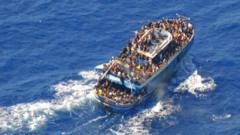Seventeen Greek coastguards, including their captain, face criminal charges linked to the fatal sinking of a migrant boat in June 2023, raising questions about Greece's response to maritime safety.
Greek Coastguards Face Charges Over Deadliest Mediterranean Shipwreck

Greek Coastguards Face Charges Over Deadliest Mediterranean Shipwreck
Legal action taken against coastguards in connection with tragic migrant boat sinking near Greece, where around 650 are feared dead.
The article text:
A naval court in Greece has officially charged 17 coastguards in connection with the deadliest migrant boat disaster in the Mediterranean Sea in a decade. The tragic incident occurred on June 14, 2023, when the overloaded Adriana fishing vessel sank near Pylos, off the coast of Greece, with as many as 650 people onboard believed to have drowned.
Survivors have shared testimonies with the BBC alleging that the coastguards were responsible for the disaster, claiming that their botched attempt to tow the vessel led to its capsizing and that they subsequently silenced witnesses. “It took us two years just for these charges to come forth, even though countless people witnessed what happened,” said Ahmad, a Syrian survivor.
Among the charges laid by the Deputy Prosecutor of the Piraeus Naval Court is one against the captain of the coastguard ship, LS-920, for causing a shipwreck that resulted in the deaths of "at least 82 people," which reflects the number of bodies that have been recovered. However, estimates suggest that as many as an additional 500 individuals, including women and children trapped below deck, perished in the tragedy.
Despite the claims made by survivors, Greek authorities have consistently denied any wrongdoing. However, the newly announced charges - which include "exposing others to danger" against four officials - point to the serious implications of the coastguard's actions during the incident.
The Adriana had been monitored by a coastguard vessel for over 15 hours before its tragic sinking. Originally en route from Libya to Italy with approximately 750 individuals on board, only 104 were reported to have survived. Investigative findings have surfaced that contradict the Greek authorities' narrative about the vessel's need for rescue. A month after the disaster, survivors accused the coastguard of deliberately capsizing their boat.
Ahmad and Musaab, two Syrian refugees who survived the ordeal, recounted their harrowing experiences and detailed the moment the coastguard allegedly caused their boat to flip. They reported that once on solid ground, coastguard officials instructed them to remain silent about the incident and hinted at intimidation tactics employed to quell discussion regarding the coastguard’s involvement.
Following the announcement of charges, Ahmad expressed a sense of vindication, stating, “I’m happy they are being held accountable, but until I see them in prison, nothing has yet been done.” His sentiments reflect a broader demand for accountability and justice from the survivors and victims' families.
The joint legal team representing these individuals welcomed the decision to prosecute the coastguards, identifying it as a crucial step toward justice and acknowledgment of the tragic event. As the legal proceedings continue, the Piraeus Naval Court will evaluate whether to proceed with a full trial against those charged or dismiss the claims altogether. The potential ramifications for the coastguards involved remain to be seen, with Greece previously emphasizing its commitment to human rights and rescues in the Mediterranean.
A naval court in Greece has officially charged 17 coastguards in connection with the deadliest migrant boat disaster in the Mediterranean Sea in a decade. The tragic incident occurred on June 14, 2023, when the overloaded Adriana fishing vessel sank near Pylos, off the coast of Greece, with as many as 650 people onboard believed to have drowned.
Survivors have shared testimonies with the BBC alleging that the coastguards were responsible for the disaster, claiming that their botched attempt to tow the vessel led to its capsizing and that they subsequently silenced witnesses. “It took us two years just for these charges to come forth, even though countless people witnessed what happened,” said Ahmad, a Syrian survivor.
Among the charges laid by the Deputy Prosecutor of the Piraeus Naval Court is one against the captain of the coastguard ship, LS-920, for causing a shipwreck that resulted in the deaths of "at least 82 people," which reflects the number of bodies that have been recovered. However, estimates suggest that as many as an additional 500 individuals, including women and children trapped below deck, perished in the tragedy.
Despite the claims made by survivors, Greek authorities have consistently denied any wrongdoing. However, the newly announced charges - which include "exposing others to danger" against four officials - point to the serious implications of the coastguard's actions during the incident.
The Adriana had been monitored by a coastguard vessel for over 15 hours before its tragic sinking. Originally en route from Libya to Italy with approximately 750 individuals on board, only 104 were reported to have survived. Investigative findings have surfaced that contradict the Greek authorities' narrative about the vessel's need for rescue. A month after the disaster, survivors accused the coastguard of deliberately capsizing their boat.
Ahmad and Musaab, two Syrian refugees who survived the ordeal, recounted their harrowing experiences and detailed the moment the coastguard allegedly caused their boat to flip. They reported that once on solid ground, coastguard officials instructed them to remain silent about the incident and hinted at intimidation tactics employed to quell discussion regarding the coastguard’s involvement.
Following the announcement of charges, Ahmad expressed a sense of vindication, stating, “I’m happy they are being held accountable, but until I see them in prison, nothing has yet been done.” His sentiments reflect a broader demand for accountability and justice from the survivors and victims' families.
The joint legal team representing these individuals welcomed the decision to prosecute the coastguards, identifying it as a crucial step toward justice and acknowledgment of the tragic event. As the legal proceedings continue, the Piraeus Naval Court will evaluate whether to proceed with a full trial against those charged or dismiss the claims altogether. The potential ramifications for the coastguards involved remain to be seen, with Greece previously emphasizing its commitment to human rights and rescues in the Mediterranean.























